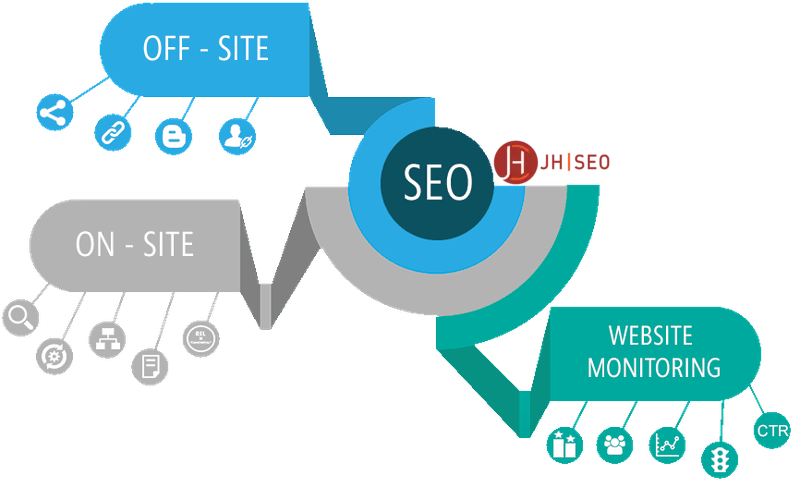Search Engine Optimization (SEO) is a vital component of any ecommerce strategy, playing a crucial role in enhancing online visibility and driving organic traffic. By optimizing content and technical elements of an ecommerce site, SEO ensures that businesses can be found more easily by potential customers searching for relevant products or services. As online competition continues to grow, a well-executed SEO strategy can help ecommerce businesses stand out in search engine results.
In the long term, SEO supports ecommerce growth by consistently attracting qualified traffic and converting visitors into customers. Unlike paid advertising, which delivers short-term results, SEO provides sustainable traffic over time, helping businesses build authority and trust. Search engines, particularly Google, favor websites that are optimized for user experience, relevant content, and technical performance, which in turn boosts search engine rankings and increases brand visibility.
Search engines and their ranking algorithms play a central role in determining which businesses appear at the top of search results. Higher search engine rankings lead to greater visibility, which increases the likelihood of clicks and conversions. For ecommerce businesses aiming to grow steadily, leveraging SEO is key to maintaining long-term success.
Search Engine Optimization
Search Engine Optimization (SEO) is the practice of enhancing a website’s visibility and ranking on search engine results pages (SERPs) through various strategies and techniques. In ecommerce, SEO is essential for driving organic traffic to product and category pages, as well as blog content. By optimizing these elements, ecommerce businesses can attract potential customers who are actively searching for their products or services, thereby increasing their chances of conversion and success.
Key SEO Elements:
- On-Page SEO
- Off-Page SEO
- Technical SEO
- Product Pages
- Category Pages
- Blog Content
Description: Involves optimizing individual pages on a website, including the use of relevant keywords, meta descriptions, and header tags to improve content relevance. This ensures that each page is aligned with user search queries and provides valuable information to visitors.
Description: Focuses on building the site’s authority through activities such as link building, where acquiring backlinks from reputable sources enhances the site’s credibility and trustworthiness. Off-page SEO helps improve the site’s overall authority and visibility in search results.
Description: Encompasses the backend aspects of a site, including optimizing site speed, ensuring mobile-friendliness, and addressing crawl errors. Technical SEO ensures that search engines can efficiently crawl, index, and understand the site’s content, which contributes to better search engine rankings.
Importance of Keyword Research:
Description: Identifying relevant keywords for product pages helps these pages rank well for search queries related to specific products. Effective keyword research increases the likelihood of products appearing in search results when potential customers are looking to purchase similar items.
Description: Optimizing category pages with targeted keywords enhances their visibility for broader search queries related to product categories. This attracts users interested in exploring various products within a specific category, driving more traffic to the site.
Description: Using relevant keywords in blog content helps attract organic traffic by addressing topics that potential customers are searching for. This not only improves the blog’s visibility in search results but also establishes the site as an authority on related subjects, engaging users and encouraging further exploration.
SEO also aligns with user intent by improving the overall customer experience. By focusing on delivering high-quality, relevant content and ensuring that the site is easy to navigate, SEO helps to meet the needs and expectations of users. This enhances user satisfaction, encourages longer site visits, and leads to improved conversion rates and long-term ecommerce success.
Search Engine Results Pages (SERPs)
Search Engine Results Pages (SERPs) show search results for user queries. For ecommerce, higher SERP rankings increase visibility and exposure to potential customers. Prominent positions on SERPs drive more traffic to your site and boost your chances of converting visitors into customers.
Higher rankings on SERPs lead to greater visibility, which directly impacts the amount of traffic your ecommerce site receives. When your site appears at the top of search results, it is more likely to attract clicks from users, resulting in increased site visits and, consequently, higher conversion rates. The visibility provided by higher SERP positions means that your products or services are more likely to be seen by potential buyers who are actively seeking solutions you offer.
Rich snippets, featured snippets, and product listings are important elements within SERPs that can further boost visibility. Rich snippets provide additional information, such as product reviews and prices, which can make your listings stand out. Featured snippets offer concise answers or summaries directly on the SERP, increasing your chances of capturing user attention. Product listings, which showcase detailed information about your products, help users make informed decisions and can drive more qualified traffic to your site.
To optimize for SERP features and enhance your ecommerce site’s presence, focus on the following strategies:
- Craft Compelling Meta Descriptions
Meta descriptions are short summaries of your page content that appear below the page title in search results. A compelling meta description can increase click-through rates by providing users with a clear, enticing preview of what to expect on your page. - Implement Schema Markup
Schema markup is a type of code that you can add to your site to help search engines understand your content better. It enables search engines to display rich snippets, such as product reviews, prices, and availability, which can make your listings more attractive and informative. - Provide Detailed Product Data
Detailed product data includes comprehensive information about your products, such as descriptions, specifications, prices, and images. Providing this data helps search engines accurately display your product listings and improves their relevance and appeal in search results.
By employing these strategies, you can better position your ecommerce site in search results and leverage SERP features to boost visibility, traffic, and conversions.
Search Engines
Search engines like Google, Bing, and Yahoo work by crawling, indexing, and ranking web pages to deliver relevant search results. Web crawlers gather information from pages, which is then indexed and stored. When a user searches, algorithms analyze this data to provide results based on relevance and authority.
Understanding search engine algorithms is crucial for effective SEO because these algorithms determine how pages are ranked in search results. Algorithms use complex criteria to evaluate and rank pages, including keyword relevance, content quality, site structure, and user engagement metrics. By comprehending how these algorithms work, ecommerce businesses can tailor their SEO strategies to align with the criteria that search engines prioritize, ultimately improving their search engine rankings and online visibility.
Search engines play a pivotal role in delivering relevant content to users by analyzing and matching search queries with the most pertinent web pages. Their algorithms are designed to prioritize high-quality, relevant content that satisfies user intent. For ecommerce sites, this means that optimizing content to address users’ needs and search behaviors is essential for ranking well and attracting qualified traffic. Ensuring that your site provides valuable and relevant information can help improve its visibility in search results and better meet the needs of potential customers.
Ecommerce sites must adapt to evolving search engine guidelines and algorithm updates to maintain and improve their search engine rankings. Search engines frequently update their algorithms to enhance the quality of search results and address emerging trends or user preferences. Staying informed about these updates and adjusting your SEO strategies accordingly—such as by focusing on new ranking factors or improving user experience—can help ensure that your ecommerce site continues to perform well in search results and remains competitive in the ever-changing digital landscape.
Search Engine Rankings
Achieving high search engine rankings is vital for ecommerce growth. It boosts your site’s visibility, making it easier for potential customers to find your products or services. This increased visibility drives more traffic, leading to higher conversions and revenue. Consistent top rankings position your business as a key player in your industry, supporting long-term growth and success.
Ranking on the first page of search results is particularly valuable because it dramatically increases traffic and enhances customer trust. Studies have shown that users are more likely to click on links that appear on the first page of search results, with a majority of clicks going to the top few listings. Being prominently featured not only attracts more visitors but also signals to users that your site is a credible and authoritative source of information or products. This visibility helps to build trust and credibility with potential customers, making them more likely to engage with your brand.
Maintaining high search engine rankings through consistent SEO efforts provides long-term benefits for your ecommerce business:
- Sustained Traffic Growth: High rankings ensure that your site continues to attract organic traffic over time, providing a steady stream of visitors without the need for constant paid advertising.
- Increased Conversion Rates: Consistent visibility in search results can lead to higher conversion rates as users are more likely to trust and engage with top-ranking sites.
- Enhanced Brand Authority: Maintaining top rankings reinforces your brand’s credibility and expertise, positioning you as a leading authority in your industry.
- Improved User Experience: Ongoing SEO efforts often involve optimizing site performance, usability, and content, leading to a better user experience and higher customer satisfaction.
- Competitive Advantage: Staying at the top of search results helps you remain ahead of competitors, capturing a larger share of the market and maintaining your leadership position.
- Cost-Effective Marketing: Once high rankings are achieved, the cost of maintaining them is generally lower compared to the ongoing expenses of paid advertising campaigns.
There is a strong relationship between search engine rankings and brand authority. High rankings not only improve your visibility but also enhance your brand’s reputation as a leading authority in your field. When your site consistently appears at the top of search results, it reinforces your brand’s credibility and expertise, which can attract more customers and foster loyalty. Building and maintaining high search engine rankings helps to establish your brand as a trusted and authoritative source, contributing to long-term business growth and success.
SEO is vital for driving long-term growth in ecommerce by boosting visibility, attracting targeted traffic, and increasing conversions. Implementing effective SEO strategies, such as optimizing on-page content, technical aspects, and off-page authority, ensures high search engine rankings and sustained success. Consistent efforts in updating and refining SEO practices are crucial for maintaining visibility and adapting to algorithm changes. By adhering to SEO best practices, businesses can build a strong online presence that supports ongoing growth and competitiveness in the digital marketplace.



































































































































































































































